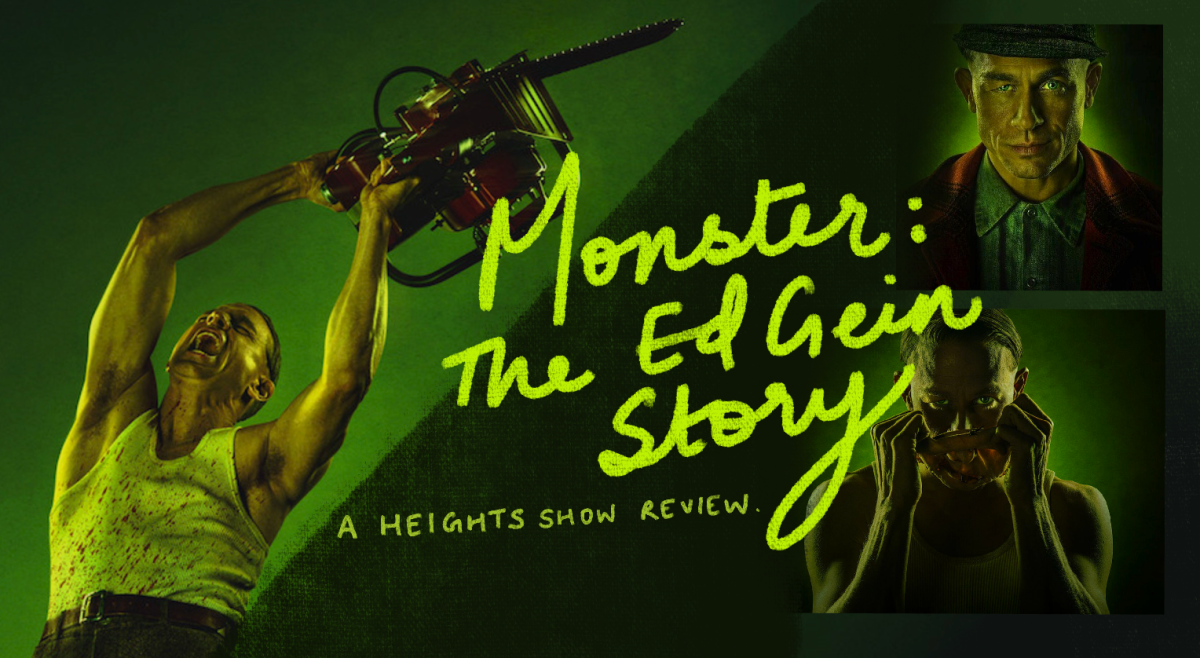
(Jashodhara Jindal / Heights Editor)
The Ed Gein Story doesn’t feel anything like The Lyle and Erik Menendez Story, and it even sets itself apart from The Jeffrey Dahmer Story. If you thought that the previous Monster stories were hard to watch, you aren’t ready for its latest rendition.
Netflix’s Monster series has always shone brightest when it highlights the people who are most affected by the titular killers: think of Niecy Nash as Glenda Cleveland in The Dahmer Story, or Ari Graynor as Leslie Abramson in The Menendez Story. This time around, The Ed Gein Story lacks any characters whom viewers can relate to.
This is problematic for any reasonable viewer because who can they possibly root for? Certainly not Ed Gein (Charlie Hunnam).
Ed Gein is far more twisted and sadistic than the Menendez Brothers, and he’s as sick as Jeffrey Dahmer on any given day. Without enduring side characters, viewers are left feeling alone and helpless—simply witnesses to Gein’s crimes.
It’s hard to imagine how anyone could enjoy such a bleak and terrorizing plot, which is why the series alternates between following Gein and Alfred Hitchcock (Tom Hollander), who is in the process of creating the classic film Psycho, which is based on one of Gein’s murders.
Hitchcock doesn’t do much to comfort viewers, though. In fact, he embraces Gein’s actions so that he can create a groundbreaking and realistic interpretation of a killer’s “psycho” behavior. The subplot is interesting in that it provides a mini behind-the-scenes for one of the most iconic films of all time. Beyond that, the Psycho subplot does little to enhance the series.
The plot might be lacking, but it’s undeniable that the series is well-acted. Ed Gein is presented as an individual with terrifyingly decisive agency—he never ponders his actions or their consequences. Hunnam embodies his character well, walking the line between Gein’s ignorance and intention.
Gein’s obsession with Nazi Germany is also at the forefront of the show—viewers are constantly flashing to the perspective of Ilse Koch (Vicky Krieps). Koch inspired much of Gein’s work with her actions against the Jewish people during the holocaust. For example, she inspired Gein to make chairs and lamp shades out of human skin.
This alternative viewpoint is intended to help viewers get inside Gein’s head and see who inspired some of his sick ideas. Instead of feeling insightful or explanatory, though, these scenes feel out of place and sort of pointless.
Gein’s schizophrenic delusions are completely fictionalized, and the real connections between Gein and Nazi Germany are ambiguous. The time taken during these German flashbacks would have been put to better use in scenes that explained the effect that Gein had on regular people.
If anything, The Ed Gein Story is an indication that society’s obsession with glorifying serial killers and creeps needs to come to an end. We’re past the point where killers were infamously intriguing, like with Dahmer, or pitiful, like with the Menendez Brothers. The Ed Gein Story is traumatizing throughout, with Gein giving audiences nothing to dote on—the series is a reminder that killers were always meant to be feared.
If The Ed Gein Story set out to isolate and horrify its viewers with the true, but fictionalized, killings of Ed Gein, then it succeeds. But audiences simply can’t appreciate Ed Gein or his story. It’s how a killer should be remembered, but it doesn’t make for good viewing.